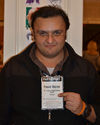Fouad Riaz Bajwa
Fouad Riaz Bajwa is a Human Technology Evangelist, Campaigner, Social Entrepreneur, Web Architect, Artist, Performer, Speaker & Writer from Lahore, Pakistan. He motivates, advocates Internet based Open Innovation adoption and builds Open technology communities that facilitate social development through technology innovation![1]
 |
 |
| Country: | Pakistan |
| Email: | fouadbajwa[at]gmail.com |
| Website: |
|
| Facebook: | |
| LinkedIn: | |
| Twitter: |
Internet Work
He advocates, teaches, speaks, writes and researches on issues related to the Internet, Human and Social Development Technology, Internet Governance, IG4D, Free & Open Source Software, Community Development, Innovation and Social Entrepreneurship, Blogging and Online Entrepreneurship.
Fouad has been actively involved in public policy information activism for the development of pro-people Information Technology and/or Information Communication Technology and Electronic Laws in Pakistan.[2]
He is also an ICT consultant and his main interest is within ICTs and FOSS. Fouad heads LPI Pakistan, a Master Affiliate of the Linux Professional Institute(LPI). LPI has trained more than 4000 people since its inception.[3]
Fouad is an ISOC Global member,[4], Next Generation Leader, [5] and also served as an ISOC Ambassador to the IGF.[6] Currently he is on the board of the APRALO. He is also a community member at the DiploFoundation.[7]
Fouad participated in the WSIS'05-World Summit on Information Society Tunisia 2005 and has been a member of the UN Secretary General's MAG Multistakeholder Advisory Group for the Internet Governance Forum since 2009.
Fouaf Riaz Bajwa founded and acted as the secretary for the FOSSFP, Free and Open Source Software Foundation of Pakistan, which advocates the use of Open Source Software for humanitarian and socio-economic development.[8]
References
- ↑ User Submitted
- ↑ User Submitted
- ↑ lpipakistan.org
- ↑ isoc.org
- ↑ isoc.org
- ↑ afrinic.net
- ↑ diplomacy.edu
- ↑ Tigweb.org